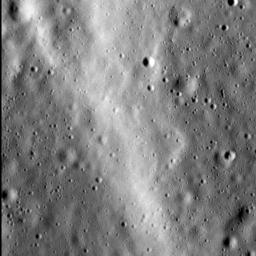Small Scarp Seen!
Caption:
In this image, we see a portion of a
wrinkle ridge
to the north of Gauguin crater, high in Mercury's
northern volcanic plains
. Wrinkle ridges are common on Mercury, but when imaged under high resolutions we get a more detailed view of these structures than before. For example, here we can see that the leading edge of the ridge is actually composed of several smaller edges. The contact between the ridge and the surrounding smooth plains is softened toward the bottom right of the image, but near the top-left that contact is sharper. Continued high-resolution imaging of Mercury's wrinkle ridges will allow scientists to more thoroughly describe their various shapes, which in turn will help us understand why the ridges formed in the first place.
This image was acquired as a high-resolution targeted observation. Targeted observations are images of a small area on Mercury's surface at resolutions much higher than the 200-meter/pixel morphology base map. It is not possible to cover all of Mercury's surface at this high resolution, but typically several areas of high scientific interest are imaged in this mode each week.
Date acquired:
March 10, 2014
Image Mission Elapsed Time (MET):
36741405
Image ID:
5906004
Instrument:
Narrow Angle Camera (NAC) of the Mercury Dual Imaging System (MDIS)
Center Latitude:
69.7°
Center Longitude:
261.6° E
Resolution:
12 meters/pixel
Scale:
The field of view in this image is about 6 km (4 mi.) across
Incidence Angle:
75.0°
Emission Angle:
6.9°
Phase Angle:
81.9°
North is to the right in this scene.
Background Info:
For information regarding the use of images, see the MESSENGER
image use policy
.
Cataloging Keywords:
| Name |
Value |
Additional Values |
| Target |
Mercury |
|
| System |
|
|
| Target Type |
Planet |
|
| Mission |
MESSENGER |
|
| Instrument Host |
MESSENGER |
|
| Host Type |
Orbiter |
|
| Instrument |
Mercury Dual Imaging System (MDIS) |
|
| Detector |
Narrow Angle Camera (NAC) |
|
| Extra Keywords |
Crater, Grayscale, Map, Volcano |
| Acquisition Date |
|
| Release Date |
2014-05-16 |
| Date in Caption |
2014-03-10 |
|
| Image Credit |
NASA/Johns Hopkins University Applied Physics Laboratory/Carnegie Institution of Washington |
| Source |
photojournal.jpl.nasa.gov/catalog/PIA18378 |
| Identifier |
PIA18378 |

 Planetary Data System
Planetary Data System
